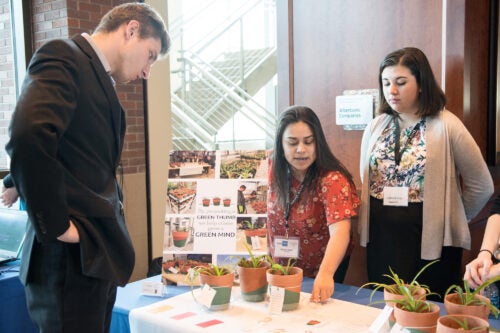
Perry Hewitt, senior advisor for engagement strategy at the Lincoln Center for the Arts in New York City, was among the judges who came to Boise State in March to judge the Idaho Entrepreneur Challenge. Twenty-four student teams from across Idaho pitched new business ideas to compete for seed money.
Hewitt wrote a recent article, “Lessons from Boise: what colleges can teach us about fostering innovation,” for the online platform Medium.com.
“Students are natural idea generators. Exposed to new concepts, people and settings, students are in a learning mindset and readily apply their minds to solving problems on campus, locally and even globally. But how can campuses build on this natural inclination to help students take their ideas a step further?” wrote Hewitt.
Hewitt, who has worked with students at Harvard and through the Junior Achievement program, wrote that she has observed consistent patterns in the ways organizations can foster entrepreneurship. They include building on a “learning mindset,” or one friendly to experimentation — even if that means failure. Another idea is encouraging would-be entrepreneurs to “start with what they know.”
“Pitches that stood out in Boise included phrases like, ‘Because I grew up on a farm, I know that …'” wrote Hewitt.
One of the winning ideas in Boise, for example, came from a team that devised a way to eliminate road ruts caused by farming equipment.
In her article, Hewitt also referenced Gordon Jones, dean of the College of Innovation that hosted the challenge.
“Several times, Jones referenced ‘blue turf thinking’ — a term associated with the creativity of the Boise State athletics department, home of the famous blue turf. I’d argue that the term is also useful in framing innovation efforts more broadly: successful innovation is about both thinking different and staying true to your roots,” wrote Hewitt.